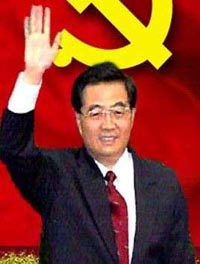China's President to visit Japan

China’s President Hu Jintao said he wanted to visit Japan early next year, a Japanese official said. It would be a magnificent sign of warming of troubled relations between the two nations.
Hu discussed the trip in talks with visiting Japanese Foreign Minister Masahiko Komura following two-day trade and investment talks in Beijing, but no details were settled.
It would be the first visit to Japan by a Chinese head of state since 1998, when former President Jiang Zemin went to Tokyo. Jiang's trip failed to produce hoped for breakthroughs in ties, presaging five years of turbulent relations that ended only with the departure last year from office of former Japanese Prime Minister Junichiro Koizumi.
"We had a difficult period," Mitsuo Sakaba, Japan's Foreign Ministry spokesman, told reporters. However, Hu's statements and plans to visit were "very positive indications," Sakaba said.
Differences remain, however, most notably over China's exploitation of a gas field that straddles a contested part of the East China Sea. Over 11 rounds of talks on the matter, China has repeatedly rejected Japan's proposal to jointly develop the fields while pushing ahead with its own drilling activities.
Sakaba said Japan hopes the issue can be resolved by the time its new Prime Minister Yasuo Fukuda visits China, either by the end of the year or early next year.
He said Komura raised the issue in talks with his Chinese counterpart, with Chinese Premier Wen Jiabao and finally in his talks with Hu, who discussed the matter only in broad outlines of principle.
"We need at this moment some strong political instruction for reaching a solution. So it's a question of political decision really," Sakaba said.
However, he said Fukuda's visit was not dependent on first reaching a final agreement on the matter.
"If we can reach a modality, it will be a success," Sakaba said. "We want to be optimistic."
Ties between the two countries have improved recently after hitting a low two years ago over territorial disputes and visits by Japanese leaders to a Tokyo war shrine, which many Chinese saw as inflammatory. Japan's brutal invasion and occupation of much of China in the 1930s and '40s have left a legacy of bitterness, one that Beijing has occasionally stoked to cater to nationalist sentiments.
In recent months, both sides have sought to avoid antagonizing the other while pushing to expand political and military exchanges.
Last week, a Chinese warship made a port call in Tokyo, the first since World War II and a sign that relations once centered on trade and diplomacy were now beginning to address security issues.
Fukuda has also promised not to visit the Tokyo war shrine while in office, apparently satisfying a key Chinese demand for a head of state visit.
The weekend's economic talks were an attempt to address a recent downturn in business ties amid concerns over Chinese copyright piracy, opaque regulations and the relative weakness of China's currency, the yuan, that foreign partners say gives an unfair advantage to Chinese exports.
In a joint statement, the sides agreed to convene a second dialogue session by the end of 2008, work toward a regional free-trade zone, promote energy efficiency and improve joint measures to combat money laundering, terrorism financing and smuggling.
The discussions, modeled after similar Chinese dialogues with the United States and European Union, brought together the largest number of Cabinet officials from the two countries since diplomatic ties were established 35 years ago.
Two modest agreements were struck during the talks; a 46.3 billion yen (US$420 million; EUR285 million) Japanese loan to fund six environmental projects; and a treaty to allow the countries' police and prosecutors to work directly on criminal extradition.
Subscribe to Pravda.Ru Telegram channel, Facebook, RSS!


